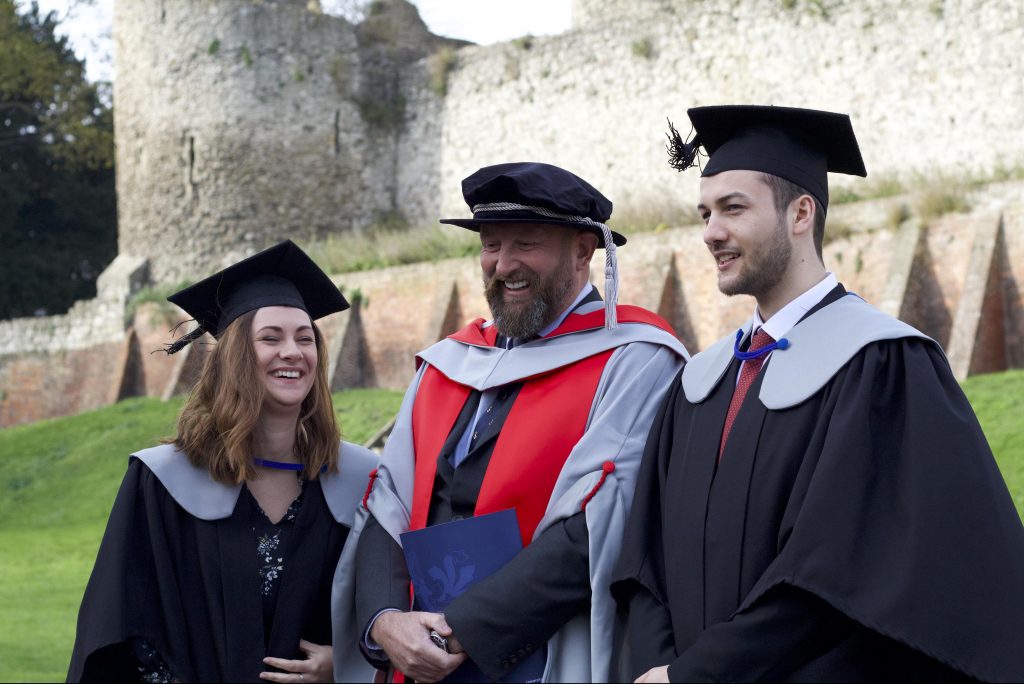The Centre for Higher and Degree Apprenticeships (CHDA) was launched by the University in September 2016, in response to the national apprenticeship reform, and since then it has been my responsibility to manage and grow this professional service department and academic centre.
Earlier this month, I had the pleasure of witnessing our very first cohort of 34 apprentices graduate at Rochester Cathedral, with proud parents and employers in attendance. Looking ahead to 2020 and beyond, we have many more graduation ceremonies in the pipeline, with almost 500 higher and degree apprentices currently studying with Kent, and more expected this academic year, thanks to our flexible-start model. The number of national employers we engage and partner with grows by the week, with more and more enquiring about additional services and/or research opportunities.
Despite CHDA’s relatively short history we have had no shortage of successes. This week, we received notification of a successful application to the new, more stringent, Department for Education’s Register of Apprenticeship Training Providers (RoATP). In July, we were ranked as a Top 50 Training Provider by Rate My Apprenticeship, ranking in a commendable 24th place out of 2,571 apprenticeship training providers. We also had a very pleasing report by Ofsted in March 2019, which described us as a ‘Good Provider’, noting that our apprentices benefit from ‘a wide range of very good support provided by university staff’ and ‘apprentices make very good progress.’
Last year, we were shortlisted for a Times Higher Education Leadership and Management Award (THELMA), and I was personally a Regional Finalist (SE) for a National Apprenticeship Award. For the last two years, Kent apprentices have won national apprenticeship prizes including National Apprentice of the Year, East of England Apprentice of the Year and Asian Apprentice of the Year. We also continue to lead/support and win tenders, on behalf of schools and the University, for the provision of apprenticeship training, including the prestigious Government Economic Service Degree Apprenticeship Programme, managed and delivered by the School of Economics, and the Kent County Council Social Worker Degree Apprenticeship Programme, managed and delivered by SSPSSR.
We are looking forward to building on these successes, growing our higher and degree apprenticeship offerings and continuing to help apprentices develop and flourish in their chosen career paths. Kent is currently a training provider for the following apprenticeships: Technician Scientist, Laboratory Scientist, Clinical Trials Specialist, Professional Economist, Chartered Manager, Senior Leader, Social Worker, Junior Management Consultant, and Policy Officer; with a number currently under development including Data Scientist, Advanced Clinical Practitioner and Research Scientist. A full list of the 215 approved apprenticeship standards from level 4 through to level 7 can be found on the Institute for Apprenticeships & Technical Education website.
Provision, using a standardised blended learning approach designed and supported by expert colleagues in UELT, takes a variety of formats, from entirely CHDA or school led and taught, to CHDA managed and school taught, to service teaching and/or the involvement of external partners. KBS has pioneered the bespoke pathway approach to apprenticeships, with the Senior Leader apprenticeship being underpinned by three employer-driven pathways; which has been heralded by the NHS. Interestingly, in some cases, Kent’s preferred format of delivery has resulted in new e-learning products benefiting both the school and the University.
Since the government’s introduction of the Apprenticeship Levy in 2017, there has been a year-on-year growth in the number of learners undertaking a higher or degree apprenticeship both nationally and at Kent, and there is no evidence to suggest this will change in the near future. It is not hard to see why it is an increasingly attractive option. For employers, apprenticeships are a cost-effective way to attract high calibre staff, develop existing employees, fill skills gaps and boost quality. For learners, the advantages include gaining a relevant qualification, learning applicable skills in the workplace, a cost-free qualification with fees paid for by the government and their employer, and the ability to gain a qualification while employed in a real job.
As a centre, we have seen first-hand the positive effect that higher and degree apprenticeships have on careers and productivity, with one of our own senior staff being a degree apprentice. We work closely with the University’s Employee Apprenticeship Manager, Loretta Izod, who can advise on the range of apprenticeship opportunities available to Kent staff.
Please do not hesitate to contact me or any member of the CHDA team if you have any questions on the provision of higher or degree apprenticeships, including market research, out-of-cycle programme approval processes, models of provision and available support.
Professor Scott S P Wildman | Director of Centre for Higher and Degree Apprenticeships
[Picture shows: Professor Scott Wildman (centre) celebrating our first apprentices graduation with Abbey Lightfoot and Richard Lamb, both Laboratory Scientist Degree Apprentices from the company UCB, graduating with a BSc (Hons) in Applied Bioscience.]
Higher & Degree Apprenticeships form a key part of our Kent 2025 strategy, which outlines how we transform lives through opportunity, discovery and community. We aim to empower students to find and shape their place in the world, and for academics to be free to explore and deepen our understanding of it. Find out more at Kent 2025.

